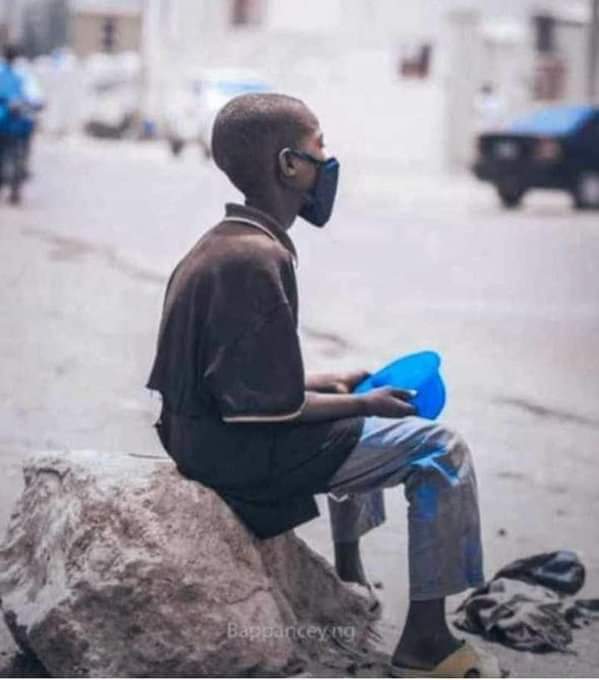National Issues
Coronavirus: A Golden Opportunity To End the Almajiri Culture -By Zainab Suleiman Okino

By the time the dust settles down on the coronavirus disease (COVID-19) pandemic, many milestones would have been recorded in improved healthcare, personal hygiene and negative economic outlook for nations of the world.
But for us in Nigeria, among other things, the almajiri narrative would have changed forever, despite their previous perilous existence and travails at the start of the pandemic.
Then, at the onset, the Northern Governors’ Forum resolved to ban the almajiri and evacuate them to their states of origin because of their exposure to the risk of contracting COVID-19.
Since then, the tempo to expel, restrict or move the almajiri has been high.
As of two weeks ago, at least 419 almajiri had been deported to Katsina, 524 to Jigawa and 155 to Kaduna, totalling 1,098,000, according to Kano State Commissioner for Local Government, Murtala Garo. Kaduna State government also deported 40 of these children to Kebbi, Benue expelled 17 of them to Bauchi, and 42 to Katsina.
Rivers State sent 150 non-indigenes to their states of origin.
“I have directed the commissioner for Social Welfare to round up and deport all vagrants, including almajiri, to their states of origin to protect our people from the threat they present to the transmission of this pandemic”, said Governor Nyesom Wike of Rivers State.
And, according to Governor Nasir El-Rufai of Kaduna state, about 30,000 almajiri have been sent back to their home states so far, while Kano State is said to have quarantined 2,000 almajiri, according to the commissioner of Health, Dr. Aminu Tsanyawa.
Thus began the unthinkable; the illegal and unconstitutional expulsion of citizens from one part of the country to the other. The poor souls are taken from their states of residence, where they eke out a horrible living on the streets, in contrast to their goal of receiving Islamic education, to their so-called states of origin, for reasons that their young ages could not even decipher.
Section 41 of the 1999 Constitution provides that, “every citizen of Nigeria is entitled to move freely throughout Nigeria and to reside in any part thereof, and no citizen of Nigeria shall be expelled from Nigeria or refused entry thereby or exit therefrom”, among other provisions on the fundamental human rights of citizens.
So, from being scums and nuisances to the society to being forcefully evicted for contributing to the rising cases of COVID-19, the almajiri misfortune has (as always though) become our collective failure. The question is no longer about the legality of violating a citizen’s right to live anywhere within his or her country; we have since passed that stage, as there was never any moral voice or legislative commitment by government to stop them — almajiri or anybody else — from being “expelled” or “deported”, as it were.
Almajiri mostly grow up in the streets without parental love, care, guidance and support, which make them highly vulnerable to crime, anti-social behaviour, brain-washing or recruitment for negative causes. They live on the generosity of alms givers and left-over from neighbourhoods and public eating places, and have no access to Western education and healthcare.
The story is told of how an almajiri died due to exposure to inclement weather and the elements. His benefactor mallam or teacher sought the permission of the Police to bury him, because of his inability to trace and contact the boy’s parents. It took three years before the deceased almajiri’s parents showed up, only to hear the bad news after all the knots were connected. Such is the treatment of the almajiri by their equally overwhelmed and uncaring mallams or teachers, even as the latter can hardly account for the numerous children in their care.
In a country with 13.2 million out-of-school children, out of which three million are almajiri, the country was (still is) sitting on a time bomb of a possible revolt of the almajiri someday. However, before that tomorrow came, COVID-19 came in from the cold. As faulty, inhuman and illegal as their expulsion under the current dispensation is, there is a silver lining at the end of the whole saga.
After many years in the “wilderness”, many were, for the first time, cared for, acknowledged as humans and kitted in beautiful apparel, as I observed during their evacuation to their communities after two weeks of quarantine by the Kaduna State government recently, looking cheerful and happy.
By now, many have also been reunited and are probably in the loving arms of their parents, even if those parents do not have much to eat. That is how it should be, otherwise life is meaningless.
The almajiri culture had been entrenched in our system over the years. Either out of fear of tempering with an age-long culture or speaking against what has become a norm, or the fact of their (almajiri) being ready tools for politicians during elections or serving as recruits for extremist groups like Boko Haram, the Northern political elite is complicit in the almajiri journey, especially because of their conspiracy of silence.
They have the power to take decisive actions and enforce these on the almajiri, but they chose to procrastinate, dither and outrightly abdicate their responsibilities. Now that it is day break, thanks to COVID-19, this crop of leaders can no longer give excuses; they now have ample opportunity to match actions with words, insist on compulsory and holistic education in both the Western and Islamic curricula for all children.
Parents should be held responsible and punished if they let loose their children on the street. No one worthy of being called a parent should care less about what his or her child eats, his or her personal safety or what the future holds for him or her.
It is also a new beginning for the almajiri and the political elite. State governments should begin to take the welfare of citizens seriously and parents should become more responsible.
It cannot be about Islamic education alone. The best of Islamic scholars don’t necessarily come from the almajiri culture, because no child raised under the harsh and vulnerable conditions that almajiri live in, can be his or her best in school, whether Islamic or Western.
It is also not about Islam, because as the Sultan of Sokoto, Sa’ad Abubakar II, had said, “Almajiri does not represent Islam, but hunger and poverty. Islam encourages scholarship and entrepreneurship and frowns at laziness, ignorance and idleness as exemplified by itinerant almajiri. Therefore, an attempt must be made to stop the practice.”
And it cannot be about moral upbringing, because there is no documented evidence of any former almajiri cleansing the society of moral decadence, criminal activities or making significant changes to our way of life in Nigeria. No child psychologist will tell you that a child facing starvation and stigmatisation as almajiri will grow up with piety, wisdom or knowledge even.
Instead, the possibility of resentment, rebellion, dissatisfaction and anger is much higher. You cannot live a child to his own devices, at an impressionable age, and expect that child to be a very useful member of the society. And we cannot breed inequality and expect a decent society and normal country.
In the past, there were people who graduated from almajiri schools to Western education and became successful in their chosen endeavours. That was when the society was cohesive and not socially stratified. Today the almajiri system is for the abandoned and the underprivileged only, as values associated with such form of learning have since been eroded.
That the government never provided the needed leadership to end the almajiri menace is an incovenient truth. That it never provided guidance and direction to the system is also true, and even when the Jonathan administration established the Tsangaya school for almajiri, it was rebuffed and never sustained after him.
Nevertheless, we now have a golden opportunity to change the narrative and put the plague behind us once and for all. Leaders at all levels must lead the way in liberating the almajiri and ending a system that is anachronistic to everything normal, ideal, decent and modern.
zainabsule@yahoo.com, www.zainabokino.blogspot.com.


















